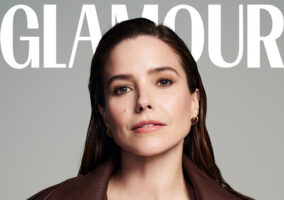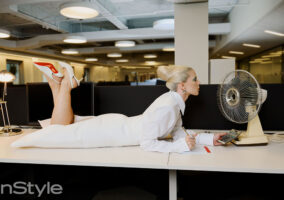Kumail Nanjiani shocked the internet last year when he revealed photos of a major body transformation leading up to his starring role in ‘The Eternals.’ Now, the 41-year-old actor and writer covers the April issue of Men’s Health, on stands March 17.
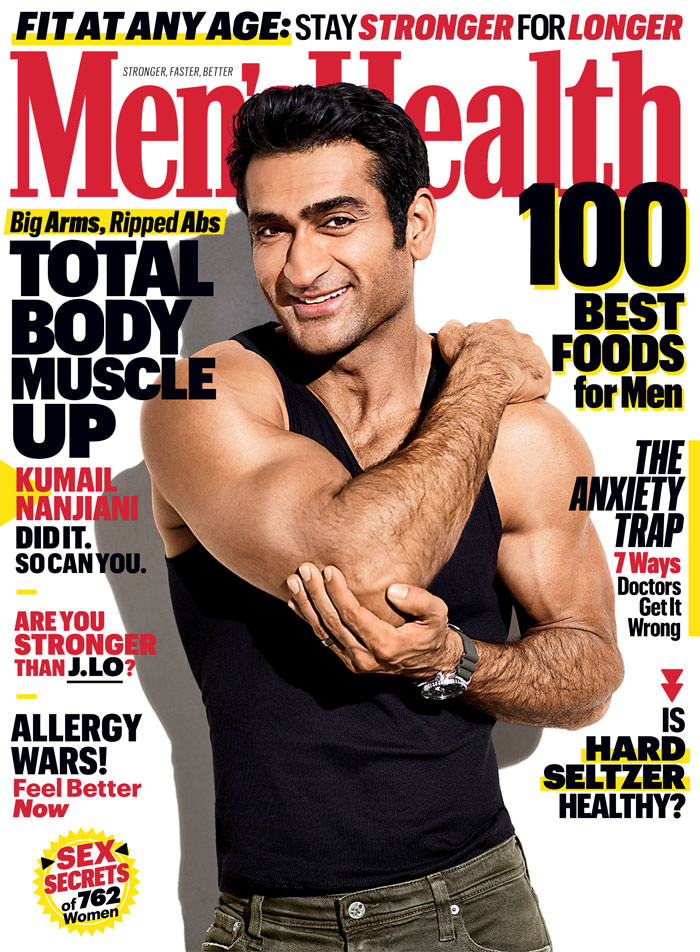
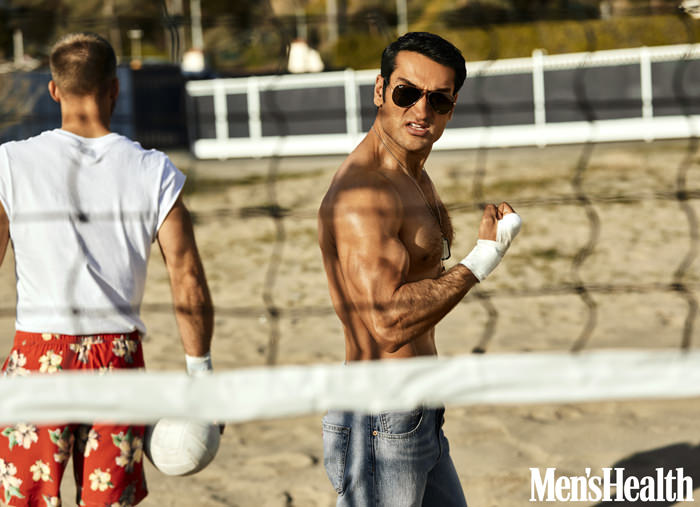
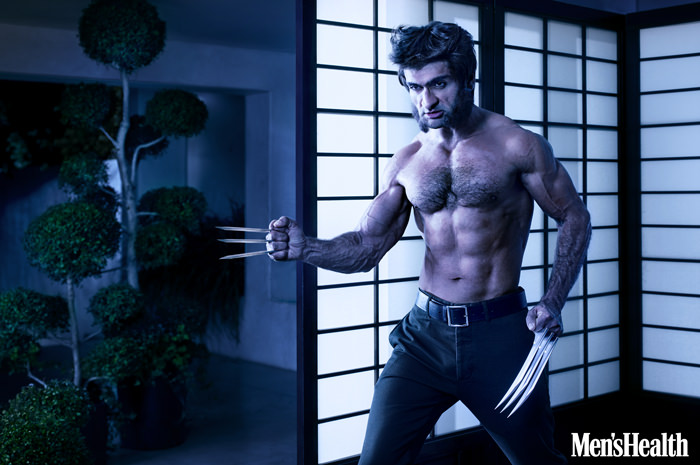
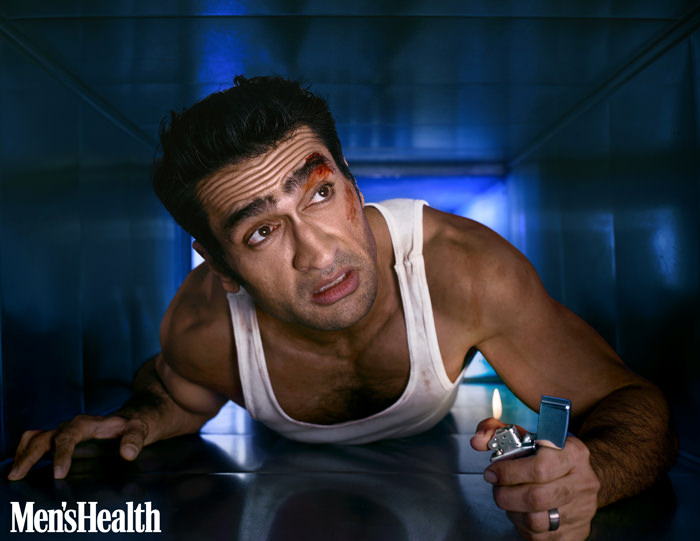
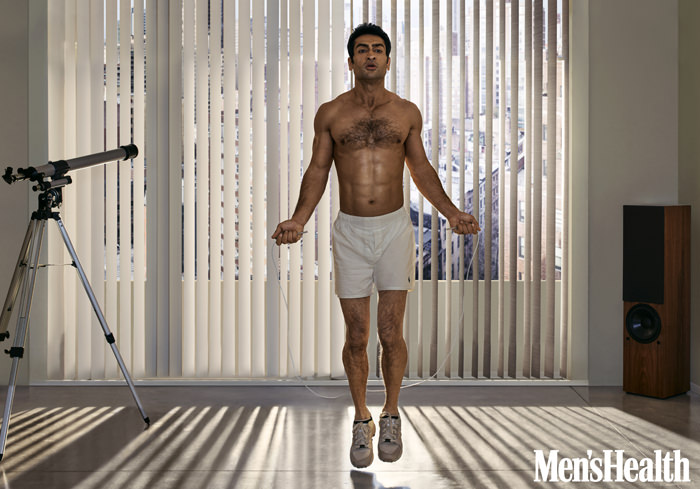
On becoming part of the Marvel universe like fellow comedians Chris Pratt and Paul Rudd, which included turning down supporting parts in other comic-book projects: “It was a pipe dream, but I was very strategic about it. I was like, ‘I don’t want to be just part of the Marvel movie; I want to be a Marvel superhero.’”
Emily V. Gordon on reactions after Kumail shared photos of his new body with the world: “Half the messages I got that day were from people being like, ‘Hey, I want to have sex with your husband, and the other half were from people making sure I was okay with my husband’s naked body being everywhere. It took a very private thing from our lives and made it incredibly public. And all I could be was really proud, because he looked amazing.”
On reframing his workout philosophy, after initially dreading the 1-hour drive to his Beverly Hills gym and the intense fitness regimen responsible for his The Eternals body: “Today, I drove to that gym and five minutes into my workout, my mood brightened. I love it.”
On changing his directive from ‘leave your body’ to ‘chase the pain’ in order to make it through the training: “I had to change my relationship to pain. You’re so designed to avoid it, but in that situation you really have to be okay with it. You have to want it. It’s almost trying to rewire your brain.”
On his anguishing workouts – from exercising during lunch breaks on Silicon Valley to having electric shocks administered to his biceps to build more muscle: “I realized, if this is what working out is, I’ve never really worked out a moment in my life.”
Kumail’s wife, Emily V. Gordon, on how he initially responded to the intense training regimen he adopted to transform into a Marvel superhero: “At first, whenever he came home from a workout, he wasn’t able to focus on anything. He was still a functioning person, but for an hour, you couldn’t really count on him to have a conversation. His body was adjusting.”
Silicon Valley co-star Thomas Middleditch on sharing fitness aspirations, and recalling a time Kumail was specifically fixated on Pakistani model Abbas Jafri: “Neither of us has a hesitation about going: ‘I wish I had his jawline or arms or whatever.’ I think a lot of sensitive weirdo comedians secretly aspire to be the tough guy. And when they finally get a reason to totally change their body – like becoming a superhero – they’re more incentivized.”
Middleditch on Kumail’s commitment to his Eternals routine: “When Kumail’s given a shot at something, he’s going to take it.”
Emily V. Gordon on Kumail’s willpower: “He’s obsessive. When Kumail gets into things, he gets really into things.”
On his own mixed personal feelings after going public with his new physique: “I don’t want to discount people who genuinely have debilitating body issues. I don’t have that. But I did start getting some body dysmorphia. I’d look in the mirror and I’d see my abs – and when I looked again, they would fade. I would just see the flaws.”
On how Instagram and comments from fans helped him to go easier on himself: “When I saw that reaction was when I was like, ‘Okay, I clearly don’t see what’s actually there.’ It’s something I’m trying to be aware of and be better at, because that’s not a good way to be. You want to be easy on yourself.”
On arriving in the U.S. as a teenager to attend college in Iowa at a school he knew little about, in a country he’d never visited: “I was scared, and I didn’t want to do it. But I had no other options, no plan. My first two weeks there were among the worst in my life.”
On learning from his occasional bad gigs while trying to launch a stand-up career in Chicago: “I wasn’t like, ‘Oh, I’ll quit.’ I was like, ‘Now I know what that feels like.’”
The Lovebirds director Michael Showalter on how Kumail stood out as a comedian when they met in 2007: “He had all these little observations about popular culture, and what he found funny about them wasn’t the most obvious thing. While a lot of comedians can be very aggressive, Kumail’s comedy was silly and whimsical.”
On transitioning to acting through the short-lived show Michael & Michael: “I’d always thought the writers do the real work and the actors are just saying the words. I was very confident in my stand-up, but I didn’t feel confident acting. I was like, ‘This is very difficult, and I want to learn more.’”
On how taking acting lessons in L.A. opened him up: “It was like therapy. I’d trained myself to not feel emotions, to push them away, because emotions are scary. And as soon as I started taking acting classes, I started crying at movies and commercials more. All these emotions I’d learned to suppress, I was not learning to get in touch with. It made my life better, made my anxiety better.”
On making a name in Hollywood playing nerdy young men, in a time when that type was in high demand: “A few years ago, I was working with a great guy – I won’t say who, but he’s a very handsome, really in-shape guy – who was making fun of me for being doughy. And I was like, ‘I could weigh another 50 pounds and I’ll still work. But if you gain ten pounds, you’ll never work another day in your life.”
On getting in shape like American Psycho’s Patrick Bateman: “I tried all the different diets: paleo, keto, fasting. I’d go for a couple weeks, hit a plateau, and then switch. Now I take all of the lessons I’ve learned from all of them combined.”
On working with a studio chef, who provided Kumail with five carefully planned meals a day, including on weekends: “They were like, ‘If you’re going to have a can of Coke today, let us know in the morning so we can adjust and account for it.’”
On figuring out his post Marvel non-superhero identity: “This is a key time to establish how it’s going to be going forward, because it could very easily go back to how things were. And I can’t do that. The goal is to get energy from the gym so I can do other stuff. People ask me, ‘Do you think you’re more intimidating now?’ And I’m like, ‘Not at all. These muscles are useless. They’re decorative.”
[Photo Credit: Emily Shur/Men’s Health Magazine]
Gugu Mbatha-Raw and Keira Knightley at the “Misbehaviour” World Premiere Next Post:
Yifei Liu and Ming-Na Wen and at the “Mulan” World Premiere
Please review our Community Guidelines before posting a comment. Thank you!

